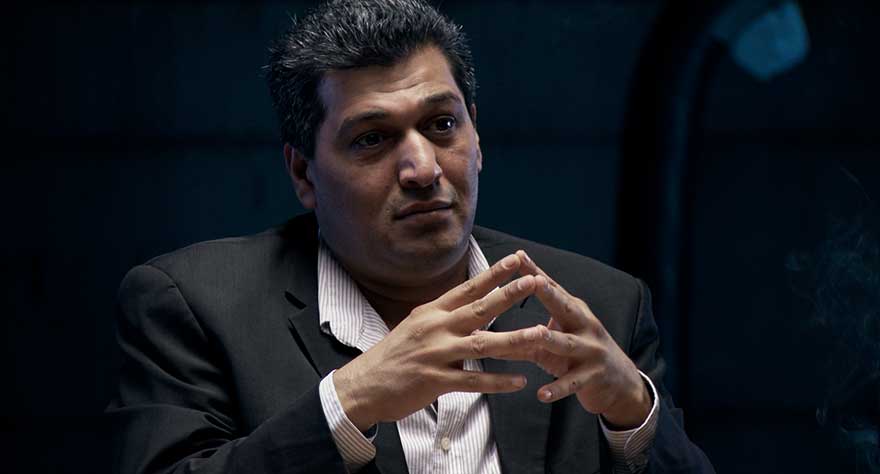
This hard-hitting interview with the man who may have started the Iraq war provides surprisingly mixed results.

This hard-hitting interview with the man who may have started the Iraq war provides surprisingly mixed results.
The media called him Curveball, but the man’s real name is Rafid Ahmed Alwan al-Janabi. If you haven’t heard either name, you might know him as the Iraqi defector who revealed to the U.S. that Saddam Hussein had weapons of mass destruction, the catalyst for the U.S. invasion of Iraq. He’s now claiming he made it all up—that he said whatever U.N. inspectors wanted to hear because, in his mind, they shared a goal of overthrowing Saddam Hussein. As he tells his story in full for the first time, director Matthias Bittner sits across a table, not unlike those used in a police interrogation. Janabi’s eyes water up as he says “To be honest, no one knows the real Rafid.” And thus starts Bittner’s 90-minute conversation with the man who may have started a war.
It’s a big accusation, and War of Lies is a movie trying to make big statements. From Bittner’s first question: “What does the word truth mean to you?” spoken in a dark room with a dramatic hard light on Janabi’s face, it’s clear this movie wants to make grand statements about humanity and personal responsibility. This sort of documentary format—with exactly one interviewee carrying the narrative, largely in a single room—has been done before with some success. But, right away, that very leading opening question betrays some problems. Usually the interviewee, guilty or not, is given the benefit of the doubt, and I can’t really tell from the tone of the interview if that’s the case here. The marketing material for War of Lies posits the question: “Is Rafid Ahmed Alwan al-Janabi simply a proud Iraqi who helped rid the world of Saddam Hussein, or a brilliant con artist whose story about chemical weapons led the US to invade Iraq?” But the director, and thus the film, seem to have a very clear agenda: to get this guy to apologize.
The format (of essentially letting Janabi talk for an hour) seems a bit at odds with this agenda. Usually if a subject is allowed to give their perspective, they’re given a little leeway, even if the audience still must choose if they’ll extend the same compassion. But these questions are so pointed at times that it seems like the interviewer has completely ignored what was just said, to get the necessary sound byte.
Maybe it’s devil’s advocate. Maybe Bittner needs to be hard-hitting, so he doesn’t lose the audience that wants him to ask the hard questions. But the way he interrogates him, the repeated attempts to drag out emotional scenes (showing Janabi images and video footage of children suffering as a result of the war in Iraq), and the editorial choice to end the movie on a somewhat forced apology (after Janabi spends 90 minutes in no minced words saying that he doesn’t regret any action that got Hussein out of power) seems to indicate the goal is something akin to: “We want to know you feel bad.” It seems to ignore the narrative leads a film can often happily discover when they choose to listen to a subject instead of going in already knowing what they want to hear. In the process of getting this apology, I think the filmmakers miss some interesting follow-up questions. For instance, the insinuation of Janabi’s storyline, for me, seems to be that the U.S. would have declared war on Iraq either way, with or without his existence. When a major military power wants to go to war, they will dig up something to justify it, then pass that on to the media. Maybe that’s a dangerous and preposterous assertion—maybe it’s not—but if that’s the story he’s trying to tell, it seems absurd to put him in the chair and give the illusion that he’s giving his side of the story but to steer the end results somewhere else.
To be clear, it is ambiguous what Janabi’s role is. To his credit, he’s an eloquent individual who throughout the film, even under pressure of very pointed questions, doesn’t seem to change his story. But he has a bit of an Amanda Knox problem in that his nonverbal behavior often veers a little creepy. He laughs at seemingly inappropriate times. He smiles after relaying a story where he was apparently scared for his life while under the custody of the German secret service. But social oddness is hardly an indication of guilt.
But let’s assume Janabi is guilty for a second. The problem is this movie is not really about the war, it’s about one person’s perspective on how he got catapulted to the national limelight. So if we think he’s guilty, which seems to be the filmmakers’ stance, what are we left with? Ultimately, maybe the format of single interview in a room just didn’t work here. Maybe we needed more outside corroboration to know whether or not to feel invested in this man’s story. The documentary is a great format to use for the dissemination of information—it’s a little less effective if the information might not even be true. In the end, I’m not even sure what to do with this film, and that’s unfortunate, because it’s a subject that even 10 years on, begs so much for clarity.